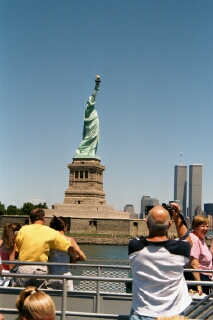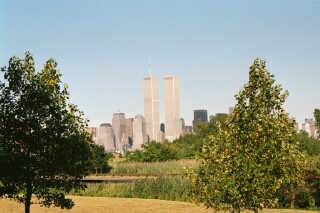
Close
To Home
Fran
Wood - Star Ledger
October 28, 2001


 |
Close
To Home |
 |
Last week's balmy days afforded a pleasure unexpected in the waning days of a New Jersey October: dining al fresco. Two co-workers and I had expected to sit inside the resturant, but the weather was so mild its patio seating had been pressed back into service.
It was one more small delight in a fall that offered more than I anticipated. The riot of morning glories over my front door had become lush each day. The mums and fall daisies in the garden had soldiered on as if it were August. The sedum had formed a rich, deep-red crown over a carpet of green.
Has Mother Nature been especially kind to us this fall, or have I just appreciated her wonders more? Both, I think. I suspect she knew we needed a strong reminder that life and seasons go on, that no matter how grim things get, she has endless whims up her sleeve to distract us.
Perhaps she knew we in the Northeast, especially those of us in the New York metropolitan area, have been in particular need of a glorious autumn - because the truth is, we still feel Sept. 11 with an acuteness that people in other places do not.
Not that I've ventured too far from home lately. But the two trips I have taken persuaded me that outside the greater metropolitan circle, the attack on New York has moved measurably further down the path from breaking news to memory.
I'm sure the level of anger and resolve is the same everywhere. But it wasn't the prime topic of conversation when we spent a week in Massachusetts earlier this month. It didn't dominate radio and television news, nor did it still overwhelm the front pages of local newspapers.
You didn't overhear conversations about it in stores or restaurants, and it wasn't talked about for long during our lunch with an old friend, Ann. It came up, sure, because Ann knows both my husband and I work for newspapers and she wanted a New York update. But the conversation soon shifted to other subjects, and when I would periodically steer it back, it was clear there was a fundamental difference: Where I find myself viewing everything in terms of how it was affected by the events of Sept. 11, she did not.
When we had dinner with friends last week, a woman who had recently visited relatives in Chicago reported a similar experience. Her own preoccupation with the events of Sept 11 seemed out of place, she said. Chicago, too, seemed to have moved on.
The weekend before, in Baltimore, my daughter and son-in-law reported the same diminishing interest in the subject among people they know. At a nuptial celebration we attended, you could instantly identify New Yorkers, New Jerseyans and Washingtonians by the converstaions over champagne flutes.
Maybe we'd be regaining our equilibrium faster, as others seem to be, if we lived farther than 50 miles from Ground Zero. But when you live where everyone knows someone who has been affected, when it's still common to come across a funeral cortege signaling yet another memorial service, when you keep hearing statistics like how many kids in such-and-such a school lost fathers and mothers and how many members a church parish lost, it's hard to get your mind on anything else.
What this produces, I suspect, is a perpetual state of anxiety. We haven't much interest in anything that seems frivolous - and in the wake of Sept. 11, that's practically everything.
Somehow, we feel more comfortable at home. That's not, as some might suppose, because we fear imminent attack or some deadly strain of disease. Nor is it due to an ostrich-line tendency to pretend, in our familiar surroundings, that nothing has changed.
I suspect it's simply because we feel more comfortable in an environment where others' sentiments and preoccupations mirror our own. Perhaps it's also a case of misery needing company. I only know thar on my brief trips out of state I couldn't wait to get back.
"Don't you imagine," my friend Nancy said the other day, "that the people of Oklahoma were talking about the Oklahoma City bombing long after the rest of us had practically forgotten about it?"
I'm sure she's right.
"Do you think things will ever get back to normal? my co-worker Robin asked wistfully, as we enjoyed the last of autumn's mild weather the other evening.
"No," my co-worker Fran and I said in unison.
"I mean in the future. I mean maybe after some time has passed?"
"No," we replied.
"Normal" has been redefined. Normal, from this point forward, will never again mean the mindless assumption that nothing bad will happening to us. Normal will be those periods of time when nothing bad is happening, but we'll always know they could and might.
But it's already clear - to me, at least - that normal also will mean a heightened appreciation of life's small daily pleasures. Like the company of friends in the outdoors because Mother Nature suddenly had a whim to provide the oppurtunity.